Legendary St. Louis Blues
Legendary St. Louis Blues
Undoubtedly the most popular and long-lasting blues piece in history is W.C. Handy’s immortal and classical St. Louis Blues. The melody has travelled round the world countless times and there is no sign of things being any different in the future.
According to Handy himself he was inspired to compose it, while walking the streets of St. Louis. In one of the streets he came across a black woman in despair. She was waiting for her man and wailing “my man's got a heart like a rock cast in the sea” ... "I hate to see that evenin' sun go down".
St. Louis Blues
Handy was 40 years old at the time and he was sensitive to the music and words of his black brethren. He wanted to combine syncopated ragtime with the melody of traditional spirituals. The end result was classical 12-bar blues with equally classical lyrics construction.
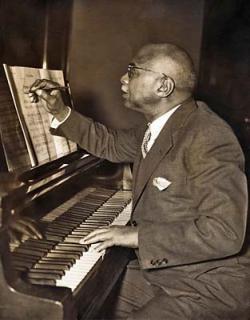
W.C. Handy
The song, like most of his well-known compositions, was written in Memphis in the Pee Wees bar in Beale Street – Handy’s band’s headquarters. The bar was called Pee Wees because of the nickname of its owner, an Italian immigrant. It was open 24 hours and it was always possible to relax there, have a drink and listen to some black music. There was a special room at the back for the needs of the orchestra, where they could do rehearsals and rest. Handy’s band performed St. Louis Blues for the first time in Pee Wees in 1914.
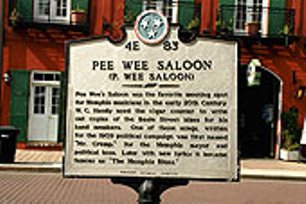
Historic Pee Wees Saloon
Handy found it difficult to publish the song. Publishers expected him to sell the copyrights for a low price. By then he knew better, having sold the rights „Memphis Blues” for $50. This time round he declined such a deal. With the help of his friend Harry Pace he published the blues himself. The song's conquest of the world began when Handy and Pace transferred their publishing company to New York two years later.
It is not known who sang the blues for the first time in New York, but it took place in the presence of Ethel Waters, future well-known jazz vocalist. She purchased performing rights from Handy and brought the song to fame in the Eastern part of America. Soon after that it became an object of interests of white vaudeville stars and record labels.
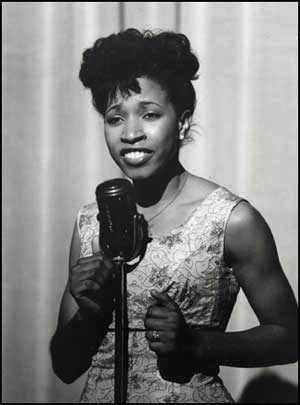
Ethel Waters
When Sophie Tucker recorded St. Louis Blues in 1917, it became the first ever blues which sales exceeded one million copies. Other labels enjoyed similar sale figures.
In 1926 George White's film "Scandals" led to controversy. It depicted a battle between blues and classical music. The latter was represented by Fairbanks Twins, who performed one Schumann's song and one Schubert's song. The former was portrayed by Margaret and Dorothy McCarthy, who sang two Handy's pieces: „Memphis Blues” and „St. Louis Blues.” After a stormy argument both sides agreed to announce Gershwin's "Rhapsody In Blue" as the winner.
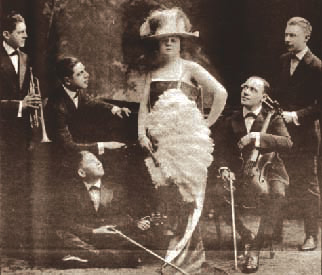
Sophie Tucker
In 1929 Bessie Smith starred in a short film "St. Louis Blues", which lasted only 16 minutes. It was the only film she ever appeared in. The film features Fletcher Henderson's Band orchestra with James P. Johnson playing grand piano, and Handy`s choir. St. Louis was the theme of a few more films in America in later years.
The composition quickly rose to fame on the other side of the Atlantic Ocean. In 1920 king Edward VIII requested the Scottish Pipers to play the blues for him. It was also performed during the wedding ceremony of Prince George and Greek Princess Marina. Years later queen Elżbieta II admitted that it was her favourite song.
It is also worth mentioning that when Italy attacked Ethiopia in 1930, the Ethiopian soldiers regarded „St. Louis Blues” as their battle song.
During the Second World War when Germany declared war on USA, jazz was banned in German-controlled territory. Musicians found the way round it by changing the titles. In France St. Louis Blues became "La Tristesse de Saint Louis"and in Austria it was renamed "Sauerkraut."
Joel Whitburn claimed in his book Pop Memories that among 100 best-selling songs in history St. Louis Blues was in the second place after „Silent Night”. 40 years after writing it Handy earned $25000 a year from royalties.
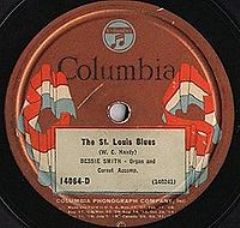
Columbia Level Bessie Smith
St. Louis blues is an essential part of jazz musicians’ repertoire. The reason it plays less significant role in blues is that it was less popular in Mississippi Delta and was played by jazz orchestra instead of guitar and harmonica. It is sometimes called “the jazzman’s Hamlet”.
For many years recording this blues would mean a likely high position in music charts. In 1920 Marion Harris’s version topped the charts and the same thing happened the following year with Original Dixieland Jazz Ban’s recording, which – in traditional New Orleans style – included instrumental solo. It was played by Larry Shields on clarinet.
1925 recording with Bessie Smith and Louis Armstrong playing cornet is regarded as one of the highest points of 20 century music. In 1993 it joined the Grammy Hall of Fame. Armstrong himself didn’t receive this honour until 2008, with his recording from 1930.
Other versions, which became hits, were recorded by famous performers, such as Rudy Vallee, Cab Calloway, Benny Goodman and Earl Hines, who named his recording "Boogie Woogie On The St. Louis Blues."
St. Louis Blues was often recorded in the 70s and 80s, and it is still recorded in 21 century. I believe its future is secure as well.
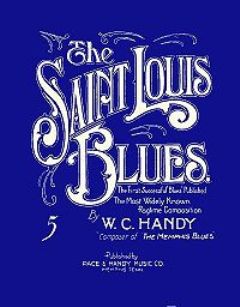
St. Louis Blues - Sheet
ST. Louis Blues, lyrics
I hate to see that evening sun go down,
I hate to see that evening sun go down,
'Cause my lovin' baby done left this town.
If I feel tomorrow, like I feel today,
If I feel tomorrow, like I feel today,
I'm gonna pack my trunk and make my getaway.
Oh, that St. Louis woman, with her diamond rings,
She pulls my man around by her apron strings.
And if it wasn't for powder and her store-bought hair,
Oh, that man of mine wouldn't go nowhere.
I got those St. Louis blues, just as blue as I can be,
Oh, my man's got a heart like a rock cast in the sea,
Or else he wouldn't have gone so far from me.
I love my man like a schoolboy loves his pie,
Like a Kentucky colonel loves his rocker and rye
I'll love my man until the day I die, Lord, Lord.
I got the St. Louis blues, just as blue as I can be, Lord, Lord!
That man's got a heart like a rock cast in the sea,
Or else he wouldn't have gone so far from me.
I got those St. Louis blues, I got the blues, I got the blues, I got the blues,
My man's got a heart like a rock cast in the sea,
Or else he wouldn't have gone so far from me, Lord, Lord!
Last Updated (Wednesday, 11 March 2015 20:35)








